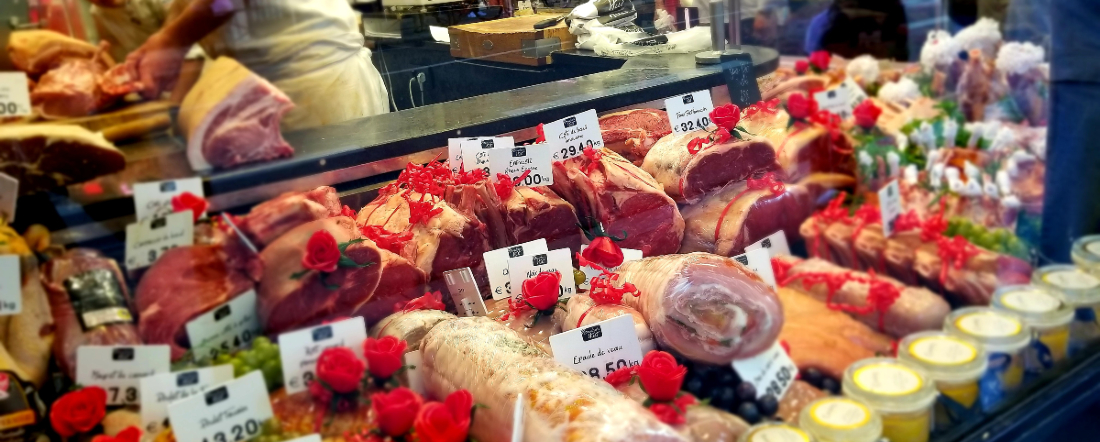
In the News
California Must Reform Meat Supply Chain if Sacramento Wants to Stay Farm to Fork Capital
- Michael Dimock, MA
- Patrick Mulvaney
-
Focus Areas
Healthy Communities -
Issues
Nutrition & Food Security -
Expertise
Public Policy Advocacy -
Programs
Roots of Change

Amid Sacramento’s annual Farm to Fork celebration, a glaring contradiction remains: The pandemic and this summer’s ransomware attack on JBS (the world’s largest meat processor) disrupted the four industrial processors centered in the Midwest and South. Together they supply the vast majority of California’s meat.
California’s small- and mid-scale livestock and poultry producers lost access to local processing as large-scale producers that usually export animals to the industrial plants took over the state’s small processors. COVID-19 sickened thousands of plant workers, hundreds died and tens of millions in lost wages resulting from the closures, particularly harming rural communities.
These events showed that the concentration of processing is dangerous. California must act to increase our own meat supply chain resilience, protect workers and aid rural communities.
A new white paper from the Food Systems Lab at UC Davis describes how a fairer regulatory environment, targeted investment from public and private sources and innovative collaborations could address these challenges. More importantly, it would help realize opportunities for small- and mid-scale producers, benefiting us all.
As we experience yet another year of worsening drought, wildfires are top-of-mind. Livestock producers have a key role to play in mitigating wildfire risks by grazing their animals on the hills of California.
Decades before COVID-19, small- and mid-scale producers in California faced crippling challenges in arranging for slaughter, processing and sale of their livestock and poultry. City and county policies regulating waste management and land use impede permitting for local slaughter and processing facilities. Lack of investment in small facilities stifles chances of broader geographic distribution of processing.
Meat remains a critical part of the American diet. Moreover, meat processing plants are the top source of food manufacturing jobs. Demand is growing, particularly among chefs, for regenerative, organic, grass-fed, “humanely-raised” and local meats. Ironically, according to Carrie Balkcom of the American Grass-fed Association, about 85% of grass-fed beef in the U.S. is imported from South America and Australia.
The growth in demand, together with our import dependence, reveal significant opportunities for California’s small- and mid-scale producers to create viable businesses.
In California, USDA inspection is the primary path to markets for livestock products. For smaller-scale livestock and poultry producers and processors, that path is expensive and often out of reach. California’s regulations for non-USDA inspected plants, called “custom exempt,” severely limit pathways to sell meat.
In contrast, states that have their own Meat Processing Inspection programs have state-inspected plants deemed “equal to” USDA plants. Meat from these plants can be sold wholesale and retail.
California’s myriad regulatory complexities arise mainly from food safety concerns. The irony is that the vast majority of tainted meat cases originate in federally-inspected industrial processing facilities. Those plants are also where rates of COVID infection and work-related injuries are highest.
California needs more small-scale slaughter and cut-and-wrap facilities. They are safer for workers and distribute skilled jobs throughout rural communities where they are needed. In the wake of the pandemic, California has its best opportunity ever to expand supplies of local meat through broader geographic distribution of new plants as well as expansion and upgrading of existing “custom exempt” plants.
The Biden Administration’s recent commitment to increase fairness in livestock and poultry markets, and USDA’s new short-term funding for local meat processing, are a great start. Couple those with systemic solutions proposed in Congress and California’s Legislature and the Golden State is positioned to create our own Meat Processing Inspection program “equal to” USDA inspection.
This change would unleash more market opportunities for small- and mid-scale producers, helping them thrive during challenging times. It would support their contribution to solving serious climate and pandemic challenges and cement Sacramento’s claim to be the nation’s Farm to Fork capital.
Click below to read the op-ed in the Sacramento Bee.
More Resources
See the PHI press release, “California Needs Policy Reform, Innovation to Enhance Meat Production Capacity.”
See recent news coverage of the report in the Daily Democrat, AgWeb News, and Agri-Pulse (subscription required).
Originally published by Sacramento Bee
More Updates
Work With Us
You change the world. We do the rest. Explore fiscal sponsorship at PHI.
Support Us
Together, we can accelerate our response to public health’s most critical issues.
Find Employment
Begin your career at the Public Health Institute.



